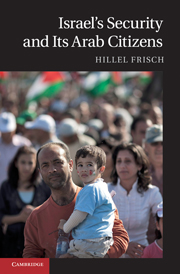Book contents
- Frontmatter
- Contents
- Figures and Tables
- Note on Transliteration and Translation from Arabic
- Acknowledgments
- Acronyms
- 1 Israel and Its Arab Citizens
- 2 Israel’s Security Profile and State–Minority Relations
- 3 State Policies toward Israel’s Palestinians
- 4 The Domestic Politics of Israel’s Arab Citizens
- 5 Extraparliamentary Organizations, Patterns of Protest, and Terrorism
- 6 Israeli Arab Identity – Commemorating the Nakba
- 7 The PLO, the PA, and Israel’s Arab Citizens
- 8 Identifying with the Enemy
- 9 Israeli Arab Political Demands and Israeli Security
- Conclusion
- References
- Index
5 - Extraparliamentary Organizations, Patterns of Protest, and Terrorism
Published online by Cambridge University Press: 05 November 2011
- Frontmatter
- Contents
- Figures and Tables
- Note on Transliteration and Translation from Arabic
- Acknowledgments
- Acronyms
- 1 Israel and Its Arab Citizens
- 2 Israel’s Security Profile and State–Minority Relations
- 3 State Policies toward Israel’s Palestinians
- 4 The Domestic Politics of Israel’s Arab Citizens
- 5 Extraparliamentary Organizations, Patterns of Protest, and Terrorism
- 6 Israeli Arab Identity – Commemorating the Nakba
- 7 The PLO, the PA, and Israel’s Arab Citizens
- 8 Identifying with the Enemy
- 9 Israeli Arab Political Demands and Israeli Security
- Conclusion
- References
- Index
Summary
In trying to gauge the threat Israel’s Arab citizens pose to the Israeli Jewish majority, it is important to look beyond the official boundaries of politics in parliament and local politics to include extraparliamentary activity. Extraparliamentary activity can take many forms and can be categorized along at least three major axes: from peaceful to completely violent activity, from lawful to illegal, and from officially sanctioned or unofficial. Though, one would expect a high degree of fit among peacefulness, legality, and official recognition and asymmetry between illegal actions and violence, the potential for deviation, especially in the former case, as we shall see, can be considerable.
Legal and peaceful activity characterizes Palestinian NGOs and several political umbrella organizations. Further down the line are the political movements, principally the Islamic Movement but also some radical nationalist groups that are not officially registered and that engage in peaceful but often illegal or quasi-legal activity. Terrorist activity is obviously the most extreme form of resistance. The crucial aspect from the state’s perspective is whether this activity is abetted by political movements whose official or public activities are essentially peaceful. Another potential form of collective action – the wedding between politics and crime that can take the form of protection rackets, drug trafficking, smuggling and other forms of economic extortion – has so far not taken root in the Arab sector in Israel.
- Type
- Chapter
- Information
- Israel's Security and Its Arab Citizens , pp. 86 - 113Publisher: Cambridge University PressPrint publication year: 2011



